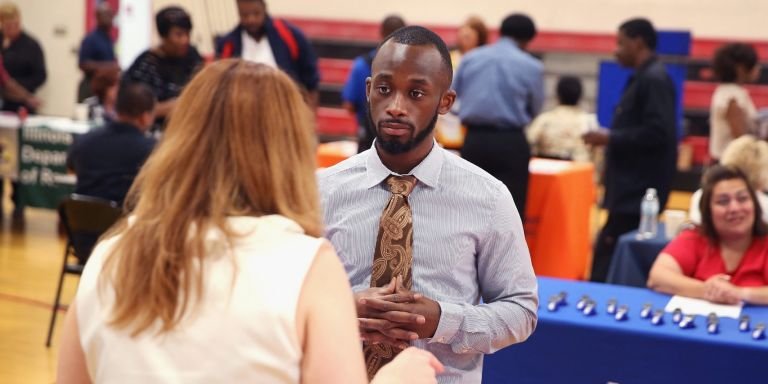The novel coronavirus pandemic effect on the health life of Black American community has been recorded to be nearly twice the deaths from the virus than is approximated to the entire population.
The Wall Street Journal reports that a recent statistics released by the U.S. Department of Labor now show that the pandemic has quelled major employment gains, and put to a halt the years of economic growth for Black people in America.
Blacks unemployment was at 5.8% in February before the pandemic wreaked the economic status quo of the United States. It was at its lowest rate since 1972, when the government began keeping records outlining race and employment. Since then, there has been a great spike in the number to 16.8% in May. According to the Bureau of Labour Statistics, the nationwide overall employment rate is at 13.3%.
“It was like everything was falling into place, and now it’s all paused,” said Anthony Steward, 34, a cook who lives in Milwaukee told the WSJ. He was working a job paying $15 per hour at Fiserv Forum where the NBA’s Milwaukee Bucks play. He was serving high-end guest box customers when he was suddenly laid off once the league’s season was suspended. Soon after, he was diagnosed with COVID-19 and is now unsure if he will be able to return to his job. “It will be a struggle to provide for your family, especially in the Black community.”
Black people were economically insecure prior to the pandemic, with less job availability and overall wealth than white individuals, according to the WSJ. A Brookings Institution report from February showed a broadening racial wealth gap; while a typical white family’s net worth is $171,000, a typical Black family’s is almost ten times lesser at $17,150.
Aggravating the economic downturn of unemployment caused by coronavirus is the massive nationwide protest at the wake of the killings of Ahmaud Arbery in Brunswick, Georgia; Breonna Taylor in Louisville, Kentucky; and George Floyd in Minneapolis.
“It’s a mistake to disconnect the social from the economic,” said Andre Perry, a scholar at the Brookings Institution told the WSJ.
“Criminal-justice reform can lead to economic justice. The more we become aware of how we’re devaluing Black lives, the more that education will unearth how we’re choking out people in economic policy.”
The past two weeks demonstration can also be viewed as an unraveling of the socioeconomic predicament of the Black people with the Black communities had been at the receiving end of the spoils from the protests.
“These protests are also a response to broader insecurity in these communities,” said American University economist Bradley Hardy to the WSJ. “You don’t feel secure with law enforcement, you don’t feel secure in your housing, with your health, or with employment.”
It was also gathered by the WSJ that 3.5 million Black Americans lost their jobs between March and April. Meanwhile, unemployment rates among Blacks eased in May, but not as much as for whites and Latinos. The May rate was a slight improvement from the roughly 14% rate before then.
Valerie Wilson, an economist with the Economic Policy Institute, told the WSJ that many public sector institutions like schools and city governments, which are top employers of African Americans cut thousands of jobs. “Job losses due to the pandemic were fairly evenly distributed across racial groups,” said Wilson. “In just one month, you’ve seen the recovery will not be.”

